27-06-16 Greek state universities in times of crisis: the hunt for funds and reform
Alternate Education Minister Sia Anagnostopoulou describes the arduous efforts to bolster a university system ravaged by budget cuts in the six years of Greece’s economic crisis in an interview with the Sunday newspaper Avgi. That includes efforts to expand postgraduate programmes and scholarship to keep bright, young academics from emigrating, linking up universities with research institutes to pool funds and knowledge, and upgrading the country’s tertiary technical schools, with a view to rendering them of equal status with university institutions.
Funding shortages
Anagnostopoulou says public universities are holding up despite steep budget cuts over the last six years, and that the ministry is also taking measures to reduce non-academic costs such as electricity and local taxes, by seeking special deals for lower rates with the Public Power Company (DEH) and with municipalities, which collect local taxes based on the size of a home or institutional real estate.
In addition, the ministry is making intensive efforts to effectively utilize EU funding (ESPA being the Greek acronym) available for tertiary education, she underlined. “But mainly, we are in constant consultations with the economic team of the government in an effort to increase the budget for universities.”
Reduction of universities’ teaching staff
Anagnostopoulou said the government has made bold efforts to reverse some of the steep personnel cutbacks under previous bailout memorandum governments. Upon taking office, she said, the government immediately hired 500 university instructors, while another 500 are already slated to be hired in September. In addition, the government is now processing applications submitted between 2008-2010 for the positions of specialised laboratory instructors (EDIP) and specialised technical laboratory instructors (ETEP). In addition, in cooperation with the health ministry an additional 50 teaching positions at the country’s seven medical schools will be secured. Finally, the government is working to rehire a “large chunk” of university administrative staff that was fired under former interior minister Kyriakos Mitsotakis (currently main opposition New Democracy leader).
The ideological underpinnings of education
“Amidst crisis and the resulting reduction of personnel and funding, the political and ideological difference between governments is based on how willing they are to support the basic pillars of the social welfare state – health and education – to support their public and free character, and to mobilise human capital in the great battle of this crisis.
Anagnostopoulou charges that SYRIZA’s predecessors engaged in a “systematic, unspoken discrediting of university personnel, and a systematic effort to undermine the character of the public and free university and of higher technical school education.
However, Anagnostopoulou was clear that the government is not in a position to reverse salary cuts suffered over several years by university academics.
Tertiary technical schools
The alternate education minister said the government aims to create parity between the academic status of universities and that of tertiary technical schools. Anagnostopoulou notes that the student-teacher ratio in technical schools is unsatisfactory, and that this was aggravated by the merging and abolition of certain faculties – “with no plan, no thinking out – nothing”- under former education minister Konstantinos Arvanitopoulos (New Democracy).
The minister stressed that tertiary technical education can play a very positive role in Greece’s economic reconstruction, but she noted that the needed reforms will require much time.
Student transfers between university faculties
Regarding the longstanding trend of students pushing for transfers from regional universities where they are admitted to universities in urban centres where they live (Athens, Thessaloniki, etc,), Anagnostopoulou noted the Council of State ruling that puts a cap on those so as to avoid a brain drain in regional institutions. While providing transfers for exceptional circumstances (health, humanitarian and such), she said the ministry is making every effort to create the preconditions for students to study far from home, a costly affair in times of crisis. That includes efforts to build up the lagging dormitory system. She said she has asked regional and municipal officials in university towns to provide lists of vacant buildings that might be suitable.
Providing opportunities for young academics
In an effort to keep fine young academics from abandoning Greece due to the crisis, the ministry after several years has for the time announced it is funding three-year scholarships for the completion of Ph.D. degrees and for post-graduate research programmes, but mainly stipends for university teaching posts that will offer crucial teaching experience.
Another key project is the aim of linking up universities with many of Greece’s finer research institutes, so as to pool resources, knowledge and experience.
Constitutional Revision and private universities
“The amendment of the constitution does not automatically imply for SYRIZA the creation of private universities. This is a neo-liberal fixation that is fervently supported by the neo-liberal wing of New Democracy and its ideological allies,” Anagnostopoulou declared. Noting that education should be public and free, she said that, “Private universities will establish education as a field of competition, whereas it should encourage cooperation and solidarity. The state must give the message that all students should have an opportunity for excellence, and not just the few. This must be the message of the left.”

